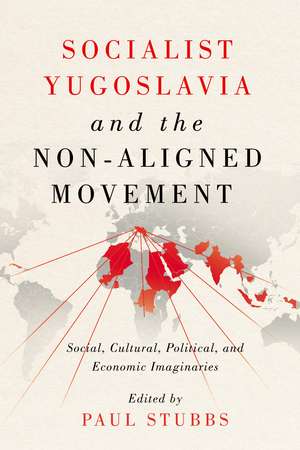Socialist Yugoslavia and the Non-Aligned Movement: Social, Cultural, Political, and Economic Imaginaries
Editat de Paul Stubbsen Limba Engleză Hardback – 15 ian 2023
After a summit in Belgrade in September 1961, socialist Yugoslavia, led by President Josip Broz Tito until his death in 1980, initiated a movement with states in the Global South. The Non-Aligned Movement not only offered an alternative to the Cold War polarization between NATO and the Warsaw Pact but also expressed the hopes of a world emerging from colonial domination.Socialist Yugoslavia and the Non-Aligned Movement investigates the Non-Aligned Movement both as a top-down, interstate initiative and as a site for transnational exchange in science, art and culture, architecture, education, and industry. Re-invigorating older debates by consulting newly available sources, the volume challenges studies that marginalize the role of socialist Yugoslavia in the Non-Aligned Movement. Contributors address topics such as women’s involvement, antifascism and anti-imperialism, cultural and educational exchange, tensions in Yugoslav diplomacy, competing understandings of economic development, the role of the Yugoslav construction company Energoprojekt, Yugoslav relations with Latin America and Africa, and contemporary support for refugees and asylum seekers as a kind of practical and affective afterlife of Yugoslavia’s non-aligned commitments. Socialist Yugoslavia and the Non-Aligned Movement offers an innovative approach to one of the twentieth century’s most important international movements and confronts issues of economic, social, and cultural rights that remain relevant today.
Preț: 726.97 lei
Preț vechi: 995.85 lei
-27% Nou
Puncte Express: 1090
Preț estimativ în valută:
139.12€ • 145.06$ • 115.62£
139.12€ • 145.06$ • 115.62£
Carte indisponibilă temporar
Doresc să fiu notificat când acest titlu va fi disponibil:
Se trimite...
Preluare comenzi: 021 569.72.76
Specificații
ISBN-13: 9780228014652
ISBN-10: 0228014654
Pagini: 408
Ilustrații: 50 figures, 4 tables
Dimensiuni: 152 x 229 x 33 mm
Greutate: 0.74 kg
Editura: McGill-Queen's University Press
Colecția McGill-Queen's University Press
ISBN-10: 0228014654
Pagini: 408
Ilustrații: 50 figures, 4 tables
Dimensiuni: 152 x 229 x 33 mm
Greutate: 0.74 kg
Editura: McGill-Queen's University Press
Colecția McGill-Queen's University Press
Recenzii
“This book will be indispensable to those who are studying the history of Yugoslavia’s nonalignment and NAM more broadly. Theoretically and methodologically innovative, it will be a valuable source but also an inspiration to scholars interested in international and transnational connections between the so-called Second and Third Worlds.” Hungarian Historical Review
“This edited volume by Paul Stubbs will serve as an essential reference point and an insight into the work of some of the most prolific participants in this discussion … highly recommended to a wide audience. [Socialist Yugoslavia and the Non-Aligned Movement] is a representative, accessible and enjoyable read [that] comes at a time when a strong voice from the peripheral and marginalised is as important as ever. Rigorous scholarship such as that provided in this book will helps us better understand and defend or regain historical memory.” Europe-Asia Studies
“This astute volume brings together the latest research by established Non-Aligned Movement specialists – most of which is being published in English for the first time. Using an interdisciplinary approach, the book deals with important questions raised by prior works and presents unused material, leading to new interpretations.” Nataša Miškovic, co-editor of The Non-Aligned Movement and the Cold War: Delhi-Bandung-Belgrade
Notă biografică
Paul Stubbs is a senior research fellow at the Institute of Economics, Zagreb, Croatia.
Descriere
In September 1961, Socialist Yugoslavia formally established a partnership with states in the Global South called the Non-Aligned Movement (NAM). Socialist Yugoslavia and the Non-Aligned Movement understands the NAM as a site for transnational cultural exchange, and explores the movement’s decolonial alternatives to global inequalities.
